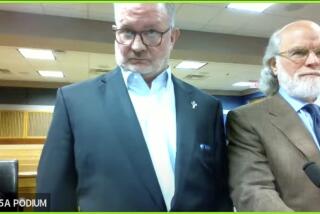Little Rock Appraiser Pleads Guilty in Whitewater Probe : Scandal: He admits falsifying loan evaluations for real estate projects by friends of McDougal, Clinton’s partner in the Ozarks resort development.
- Share via
LITTLE ROCK, Ark. — A Little Rock land appraiser pleaded guilty Monday to creating phony evaluations of real estate projects involved in the Whitewater investigation and agreed to provide evidence to independent counsel Kenneth W. Starr.
Robert W. Palmer, 44, entered his plea before a federal judge as part of an agreement with Starr, who has been investigating President Clinton’s investment in the Ozarks resort development known as Whitewater.
Palmer’s plea is expected to be followed today by the announcement of another plea agreement between Starr and former Associate Atty. Gen. Webster L. Hubbell, a close friend of the President and former law partner to First Lady Hillary Rodham Clinton.
It is unlikely that Palmer can provide Starr with any direct evidence to support the central allegation in the Whitewater case that money from the now-defunct Madison Guaranty Savings & Loan was diverted illegally into Clinton’s Whitewater real estate investment or his gubernatorial campaign fund.
Nevertheless, because Palmer was responsible for drafting false appraisals for loans to real estate projects by friends of Madison owner James B. McDougal, he is likely to provide insight into a wide range of financial transactions--perhaps including some aspects of the joint Clinton-McDougal investment in Whitewater.
He also could shed some light on a contention by the government’s star witness, David Hale, that he was pressured by McDougal and Clinton to make an improper $300,000 government-backed loan to McDougal’s wife, Susan. More than $100,000 of that money passed through the Whitewater accounts.
Clinton has denied that he pressured Hale to make the loan.
In the document that Palmer signed in court, he admitted that in February, 1986, he falsified and backdated at least 25 appraisals of Madison-financed real estate projects in a vain effort by the thrift management to avoid being seized by the government for insolvency.
Two weeks later, he said, he submitted a bill for $15,350 to Madison on which he intentionally misrepresented his charges as “a real estate consultant fee” for what he described as a “market feasibility and economic analysis.”
The plea agreement made no mention of numerous other appraisals that Palmer did for Madison, or of the $61,000 loan he received from the thrift. In doing his appraisals, according to the government, Palmer never disclosed his financial interest in the institution.
Palmer’s offer to cooperate with Starr was seen as a setback for Clinton’s successor as governor of Arkansas, Jim Guy Tucker, who is also a subject of Starr’s investigation. Among the many projects that Palmer appraised was the Castle Water and Sewer property in which Tucker invested.
In addition, Palmer did the appraisal of property owned by Hale, a former municipal judge who also ran a federally backed small business investment corporation. By exaggerating the value of the property, Palmer enabled Hale to raise the capital needed to fund the controversial $300,000 loan to Susan McDougal.
The charge to which Palmer pleaded guilty carries a maximum sentence of five years in jail and a maximum fine of $250,000. No date has yet been set for his sentencing.
In exchange for his cooperation, Starr pledged that Palmer would not be prosecuted for any other potential crimes related to the work he did for Madison. Presumably, Starr would also recommend a reduced sentence if Palmer cooperates fully with the probe.
In a statement issued by his lawyer, Palmer said he decided to cooperate with the independent counsel “as a matter of conscience” for conduct that did not adhere to the standards of his profession. He said he acted improperly primarily out of friendship, not out of a desire to profit financially.
Had President Clinton’s financial affairs not come under the scrutiny of a special investigator, Palmer might never have been called to account for his actions. As he noted in his statement:
“The election from this state of a President of the United States has led to intense national scrutiny of business transactions which are now almost a decade old, and I must now account for my own carelessness from that era.”
Palmer’s plea marked Starr’s first appearance in court since he succeeded Robert B. Fiske Jr. last summer as independent counsel in the Whitewater case.
Hubbell is expected to plead guilty to overbilling the government for work he did as a lawyer to help resolve the Madison accounts after it was closed in 1989.
It is not yet known what information Hubbell may supply to the independent counsel as part of any plea agreement.
Times staff writer William Rempel contributed to this story.
More to Read
Sign up for Essential California
The most important California stories and recommendations in your inbox every morning.
You may occasionally receive promotional content from the Los Angeles Times.













